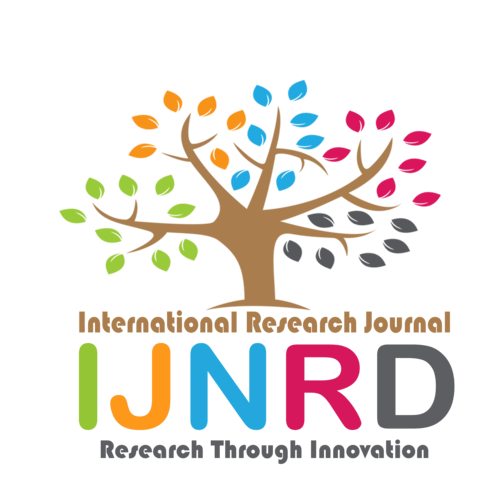|
|||||||||||||||

|
INTERNATIONAL JOURNAL OF NOVEL RESEARCH AND DEVELOPMENT International Peer Reviewed & Refereed Journals, Open Access Journal ISSN Approved Journal No: 2456-4184 | Impact factor: 8.76 | ESTD Year: 2016 Scholarly open access journals, Peer-reviewed, and Refereed Journals, Impact factor 8.76 (Calculate by google scholar and Semantic Scholar | AI-Powered Research Tool) , Multidisciplinary, Monthly, Indexing in all major database & Metadata, Citation Generator, Digital Object Identifier(DOI) |
||||||||||||||
Issue: April 2024
Volume 9 | Issue 4
Review Result and Publication of Paper within : 2-3 days
Click Here For more DetailsFor Authors
Forms / Download
Published Issue Details
Editorial Board
Other IMP Links
Facts & Figure
Impact Factor : 8.76
Issue per Year : 12
Volume Published : 9
Issue Published : 95
Article Submitted :
Article Published :
Total Authors :
Total Reviewer :
Total Countries :
Indexing Partner
Join RMS/Earn 300
Licence
This work is licensed under a Creative Commons Attribution-NonCommercial 4.0 International License







|
Published Paper Details
|
|
| Paper Title: | "The Interplay of Cultural Identity and Survival in Chimamanda Ngozi Adichie's "Americanah": Examining the Racialized Experiences of African Immigrants in the West" |
| Authors Name: | Sana Fatima |
| Download E-Certificate: | Download |
| Author Reg. ID: |
IJNRD_186930
|
| Published Paper Id: | IJNRD2302020 |
| Published In: | Volume 8 Issue 2, February-2023 |
| DOI: | |
| Abstract: | "The Interplay of Cultural Identity and Survival in Chimamanda Ngozi Adichie's "Americanah": Examining the Racialized Experiences of African Immigrants in the West" Abstract Chimamanda Ngozi Adichie's novel "Americanah" delves into the complexities of race politics in Western societies and the multifaceted psychological struggles faced by African immigrants in their quest to maintain their unique identities while living in racialized communities. Through the experiences of the protagonist Ifemelu, the novel highlights the insidious nature of racism in American society and the pressure to conform to societal norms. The experiences of both Ifemelu and the undocumented immigrant Obinze serve as a reminder of the pervasiveness of racism and its impact on personal and cultural identity. Adichie's novel serves as a thought-provoking commentary on the immigrant African experience and the interplay between cultural preservation and survival in societies ruled by racial hegemony. Key Words : Race Politics, Immigrant Struggles, Cultural Identity, Afropolitan Discourse, Racial Hegemony, Western Socities, Afrocentricism, Postcolonialism, Intersectionality, Xenophobia, Black Feminism, Epistemic Violence, Exclusion, Representation “Americanah" by Chimamanda Ngozi Adichie, probes into the intricacies of race politics prevalent in Western societies and highlights the multifaceted psychological struggles of African immigrants in their quest to maintain their unique identities amidst racialized communities. With the preconceived notion that life in the West equates to greater opportunities and freedoms, these immigrants are met with a social system that forces them to adopt a stereotypical "black" identity, disregarding their individual differences. The protagonist, Ifemelu, embodies the complexities of this experience as a Nigerian immigrant who initially lacks an understanding of race. However, her encounters with prejudice and racism shape her newfound racial identity. Through her blog, Raceteenth or Various Observations About American Blacks (Those Formerly Known As Negroes) by a Non-American Black, Ifemelu sheds light on the discrepancies between Black Non-Americans and Black Americans and exposes the prevalent misconceptions about African Americans. Ifemelu's personal journey through racism, including both institutionalized and internalized forms, illuminates the insidious nature of racism in American society. Adichie's thought-provoking portrayal of race challenges societal perceptions and offers an alternative lens through which to view American culture through the eyes of African Americans. Ifemelu's experiences with race in America are disquieting, as she perceives the racial discourse to be limited by a respectability politics that taints the reality of racism. This hinders meaningful conversations between blacks and whites and erodes her sense of self and community. When her black American boyfriend, Blaine, protests against racism, she finds solace in attending a party, thereby distancing herself from the racial struggle. However, the harsh realities of racism catch up with her as she transforms from an individual with a unique identity, to an anonymous black entity, reduced to nothing more than a colored girl. Ifemelu recounts her frustrations by stating, “I came from a country where race was not an issue; I did not think of myself as black and I only became black when I came to America.” This sudden shift in her racial identity is a source of discord and she becomes another statistic, a victim of the insidious effects of racism in America. Despite her confidence and perception of her own worth and beauty, racism works to erode even her sense of self-assuredness, as the banal comments and stares about her hair and Africanness become a constant reminder of her racial identity. Ifemelu takes to her blog to articulate her views on race in America, and at a dinner party, she posits that “real deep romantic love” could be a solution to the problem of race in America. This notion of love goes beyond the mere comfort of shallow relationships, but instead, it is a love that transforms, twists and wrings out, making one breathe through the nostrils of the beloved. Racism is perpetuated through political exclusion, while economic exclusion enforces it. Obinze, residing in the UK unlawfully, faces significant impediments in his prospects. To support himself and make a living, he is forced to obtain a National Insurance card from another immigrant, at the cost of a portion of his salary or the potential loss of everything. His undocumented status renders him unable to travel, leaving him susceptible to apprehension by immigration authorities, confining him to the most low-paying jobs where the state's surveillance technologies are leniently utilized. His existence is one marked by imperiled, involuntary immobility. The novel serves as a poignant reminder of the pervasiveness of racism, which continues to intensify. It highlights the inhospitable nature of the American ideal for minorities, as well as their undesired status in the UK. When the suffocating effects of anti-black racism becomes unbearable, the only viable option is a serious contemplation of repatriation. No matter how much one may desire, a black immigrant or American cannot fully assimilate into the American society without consistently facing rejection. This process of becoming black, of being categorized and relegated to the sidelines, is shared by both African Americans and non-American blacks, the imperial and colonial subjects alike. The title "Americanah" symbolizes a new identity, one forged through years of traumatic struggles with identity within a society that disregards the presence of cultures, languages, and skin tones outside of the white norm. The primary characters in the novel are victims of the brain drain that plagued Nigeria during the era of military rule. Adichie's artistic portrayal of African emigration is driven mainly by a yearning for better and/or more expeditious education, as exemplified by Ifemelu's experience. In Chimamanda Ngozi Adichie's novel "Americanah," the immigrant African experience in America and Britain is marked by the interplay between preservation of cultural identity and the demands of survival in societies ruled by racial hegemony. Despite the desire to hold on to their linguistic and cultural heritage, the pressure to conform to the standard American English, which is determined by race, and the necessity of securing corporate jobs through the straightening of natural hair, creates a challenging balance for African immigrants. Adichie presents herself as a champion for a form of globalization that values and respects the cultural identities of all ethnic groups. However, no African immigrant in the novel is immune to the loss of personal and cultural identity in their pursuit of survival. The protagonist, Ifemelu, who blogged about opposing racial injustice and promoting racial pride, ultimately experiences the fluidity of identity and the cultural immersion that occurs through migration. The irony and tragedy of the narrative lies in Ifemelu's self-resentment at her realization of the extent to which she has changed and lost parts of herself in her quest for acceptance in a foreign land. The novel highlights the inherent conflicts and challenges faced by immigrant Africans as they navigate the racial landscape of America and Britain. In Americanah, Adichie highlights the identity crisis that African immigrants face in the West. Through the character of Ifemelu, she explores the profound sacrifice of personal and cultural identity that often accompanies one's pursuit of social-economic mobility. The novel ultimately raises the question of the extent to which one ought to compromise one's individuality for the sake of survival. Adichie masterfully portrays the complexities of immigration, race, and identity, offering a nuanced critique of the Afropolitan discourse. Rather than presenting Afropolitans as fashionable trendsetters, she exposes the realities of the cultural and political struggles faced by African immigrants. Despite these difficulties, Adichie argues that embracing African material culture and heritage can serve as a form of self-assertion and contribute to the growth and development of the continent. Conclusion In conclusion, Chimamanda Ngozi Adichie's "Americanah" provides a thought-provoking examination of the complexities of race in Western societies, specifically America and the UK. Through the experiences of the protagonist, Ifemelu, and other African immigrants, the novel exposes the insidious nature of racism and its negative effects on personal and cultural identity. The story highlights the challenges faced by African immigrants as they navigate their new identities, balancing the preservation of their cultural heritage with the demands of survival in a racially hegemonic society. The novel serves as a reminder that the reality of racism is far from the American ideal and that African immigrants continue to face significant barriers in their pursuit of better opportunities. Adichie's novel challenges societal perceptions and offers an alternative lens through which to view American culture, highlighting the need for a more inclusive and culturally respectful form of globalization. Ultimately, "Americanah" is a poignant and powerful reminder of the continuing struggle for racial equality and a call to action for change. Works cited – Annand, David. “Americanah” by Chimamanda Ngozi Adichie: Review. Telegraph. 19 Apr. 2013. Web. 15 Jan. 2014. Adichie, Chimamanda Ngozi. Americanah. First edition. New York: Alfred A. Knopf, 2013. Arthur, John A.Invisible Sojourners: African Immigrant Diaspora in the United States. Westport, CT: Praeger, 2000. Baldwin, James. The Fire Next Time. New York: 1962 Bell, D. Silent covenants: Brown v. Board of Education and the Unfulfilled Hopes for Racial Reform. New York: Oxford University Press. 2004. Berrey, Ellen. The Enigma of Diversity: The Language of Race and the Limits of Racial Justice. The University of Chicago Press, Chicago, 2015. Creese, Gillian. The New African Diaspora in Vancouver: Migration, Exclusion and Belonging. University of Toronto Press, 2011. Chude-Soke, Louis. “The Newly Black Americans: African immigrants and black America” in Transition, Issue 113, Bloomfield: Indiana University Press 2014, pp. 52-71 Day, Elizabeth. “Americanah” by ChimamandaNgoziAdichie – Review. Observer 14 Apr. 2013. The Guardian. Web. 15 Jan., 2014. |
| Keywords: | Race Politics, Immigrant Struggles, Cultural Identity, Afropolitan Discourse, Racial Hegemony, Western Socities, Afrocentricism, Postcolonialism, Intersectionality, Xenophobia, Black Feminism, Epistemic Violence, Exclusion, Representation |
| Cite Article: | ""The Interplay of Cultural Identity and Survival in Chimamanda Ngozi Adichie's "Americanah": Examining the Racialized Experiences of African Immigrants in the West"", International Journal of Novel Research and Development (www.ijnrd.org), ISSN:2456-4184, Vol.8, Issue 2, page no.a178-a179, February-2023, Available :http://www.ijnrd.org/papers/IJNRD2302020.pdf |
| Downloads: | 000118756 |
| ISSN: |
2456-4184 | IMPACT FACTOR: 8.76 Calculated By Google Scholar| ESTD YEAR: 2016 An International Scholarly Open Access Journal, Peer-Reviewed, Refereed Journal Impact Factor 8.76 Calculate by Google Scholar and Semantic Scholar | AI-Powered Research Tool, Multidisciplinary, Monthly, Multilanguage Journal Indexing in All Major Database & Metadata, Citation Generator |
| Publication Details: |
Published Paper ID:IJNRD2302020 Registration ID: 186930 Published In: Volume 8 Issue 2, February-2023 DOI (Digital Object Identifier): Page No: a178-a179 Country: New Delhi, India, India Research Area: Arts Publisher : IJ Publication Published Paper URL : https://www.ijnrd.org/viewpaperforall?paper=IJNRD2302020 Published Paper PDF: https://www.ijnrd.org/papers/IJNRD2302020 |
| Share Article: | |
|
Click Here to Download This Article |
|
| Article Preview | |
|
|
|
Major Indexing from www.ijnrd.org
| Semantic Scholar | Microsaoft Academic | ORCID | Zenodo |
| Google Scholar | ResearcherID Thomson Reuters | Mendeley : reference manager | Academia.edu |
| arXiv.org : cornell university library | Research Gate | CiteSeerX | PUBLON |
| DRJI | SSRN | Scribd | DocStoc |
ISSN Details
 |
 |
ISSN: 2456-4184
Impact Factor: 8.76 and ISSN APPROVED
Journal Starting Year (ESTD) : 2016
DOI (A digital object identifier)
Conference
Open Access License Policy
Important Details
Social Media
| Copyright © 2024 - All Rights Reserved - IJNRD |












Facebook Twitter Instagram LinkedIn